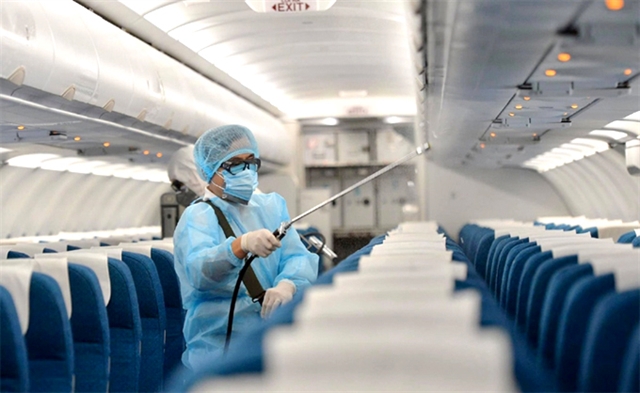 Economy
Economy

Aviation stocks have enjoyed strong gains following the news that social distancing orders will be relaxed after September 15 and business will gradually resume after prolonged restriction measures.

|
| A health worker sprays disinfectant inside a Vietnam Airlines aeroplane at Nội Bài International Airport in Hà Nội. Shares of Vietnam Airlines JSC (HVN) have soared 28 per cent since early September. Photo courtesy of Vietnam Airlines |
HÀ NỘI — Aviation stocks have enjoyed strong gains following the news that social distancing orders will be relaxed after September 15 and business will gradually resume after prolonged restriction measures.
Director General of the Civil Aviation Authority of Việt Nam (CAAV) Đinh Việt Thắng has sent a written report to the Ministry of Transport asking for approval for the plan to operate regular domestic passenger routes during the COVID-19 pandemic prevention and control period.
Currently, only some cargo flights are allowed. In the near future, the CAAV plans to expand passenger routes within the country.
Shares of Vietnam Airlines JSC (HVN) have soared 28 per cent since early September. The State-run Airports Corporation of Việt Nam (ACV) have risen 8 per cent and low-budget carrier Vietjet (VJC) have gained 2 per cent.
On September 9, HCM City announced the plan of gradual easing of social distancing measures. According to a draft by the city’s Department of Health, 'COVID-19 green cards' are applicable for those who have been fully vaccinated.
COVID-19 patients who have recovered or people under 65 years old who have had two doses are allowed to participate in activities in public places, go to school, go to work, even travel locally and abroad.
Prime Minister Phạm Minh Chính has agreed in principle with the Ministry of Culture, Sports and Tourism's proposal on a pilot plan to welcome international tourists with vaccine passports to Phú Quốc resort island in the southern province of Kiên Giang for six months from October.
After the first and second outbreaks of COVID-19 in April 2020, the third and fourth wave returned, falling right in the peak flight season during the traditional Tết holiday and the Summer holiday season, causing airlines' revenue to decrease by over 90 per cent over the same period last year.
Airlines currently have to spend over VNĐ100 billion (US$4.4 million) to pay for aircraft rental, bank loans, input service fees, aircraft maintenance and repair fees, as well as employees wages. This seriously affects the cash flow of the businesses.
Vietnam Airlines (HVN) had accumulated losses of over VNĐ17 trillion as of June, and now has negative equity of VNĐ2.75 trillion.
In 2021, the company plans to sell eleven A321 aircraft, allocating maintenance costs, disbursing a support package of VNĐ12 trillion with the target to cut VNĐ6.8 trillion costs.
It sets a pessimistic business plan with a consolidated profit after tax of negative VNĐ14.3 trillion this year, increasing the loss by 30.5 per cent compared to 2020.
Low-budget carrier Vietjet (VJC) used to earn an average of VNĐ5 trillion in annual net profit in the 2017-2019 period.
In the first half of this year, thanks to expanding financial investment, selling assets, VJC still made a gross profit, but the company suffered a big loss in its main business, which is air transport.
The State-run Airports Corporation of Việt Nam (ACV), operating in the aviation auxiliary industry, also saw a sharp decrease in revenue. In the first half of this year, ACV's revenue from ground services, baggage and passenger security screening services, all dropped sharply.
However, with a large amount of money, ACV was largely compensated by deposit interest with nearly VNĐ1 trillion. The company has more than VNĐ33 trillion in cash and deposits, equivalent to 60 per cent of total assets as of late June 2021.
The prolonged crisis sometimes caused the market prices of HVN, VJC, and ACV to halve and hit the bottom in April 2020. Although the business results have not recovered, these stock prices have still recovered by more than 50 per cent after the pandemic was brought under control in the third quarter of last year.
Since the first wave of COVID-19, HVN shares of Vietnam Airlines dropped sharply from VNĐ30,000 per share to only VNĐ15,000 per share, now have recovered to VNĐ25,000 per share.
Vietjet's VJC also experienced a significant decrease during the first outbreak, from VNĐ145,000 per share to the bottom of VNĐ92,000 per share in April 2020, but has since increased to VNĐ130,000 per share.
ACV now is hovering around VNĐ84,000/share, doubling the bottom set in March 2020.
According to market experts, compared to the initial value, there is still large room for aviation stocks to grow. As a super-profitable industry, when the whole world and Việt Nam can control the pandemic, aviation is forecast to have a strong leap.
A recent report, Agriseco Securities stated that the aviation industry will recover strongly in the 2022 - 23 period. It also expects that business results and stock prices of aviation enterprises will return as before, and this is the time to accumulate this industry group in investors’ portfolios. VNS




